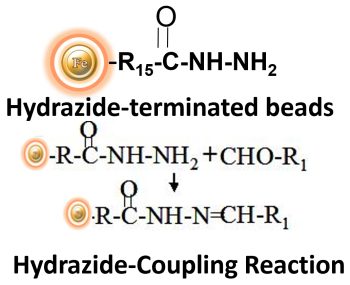
BcMag™ Hydrazide-Terminated Magnetic Beads are uniform magnetic beads grafted with a high density of hydrazide functional groups on the surface. Hydrazide chemistry is effective for labeling, immobilizing, or conjugating glycoproteins via glycosylation sites, which are frequently (as with most polyclonal antibodies) positioned in domains distant from the critical binding sites whose function needs to be preserved. Coupling antibodies in this manner selectively targets heavy chains in the Fc portion of the molecule, assisting in the best possible preservation of antigen binding activity by the ends of the Fv regions. At pH 5 to 7, hydrazide-terminated supports and compounds will conjugate with carbonyls of oxidized carbohydrates (sugars), resulting in the production of hydrazone linkages. The hydrazide beads are suitable for conjugating larger glycoproteins and glycolipids, carbohydrates, or other ligands. Moreover, the hydrophilic surface ensures low nonspecific adsorption, excellent dispersion, and easy handling in various buffers.

Workflow
The Beads work perfectly as affinity resin for affinity purification to refine molecules, cells, and parts of cells into purified fractions. After conjugation with ligands, add the beads to a sample containing the target molecules, then mix, incubate, wash and elute the target molecules.

Features and Benefits
●
Specific immobilization – the hydrazide-activated beads bind exclusively to pure glycoproteins containing sugar groups that have been gently oxidized with periodate (e.g., sialic acid).
●
Stable covalent bond with low levels of ligand leakage
●
Maintains antibody function – immobilizes IgG via the Fc region, leaving both antigen binding sites available for target capture
●
Low nonspecific binding
●
High capacity—Immobilize 15-20µg antibody/mg beads
Learn More
Instruction Manual
MSDS
Related Affinity Magnetic Beads →


